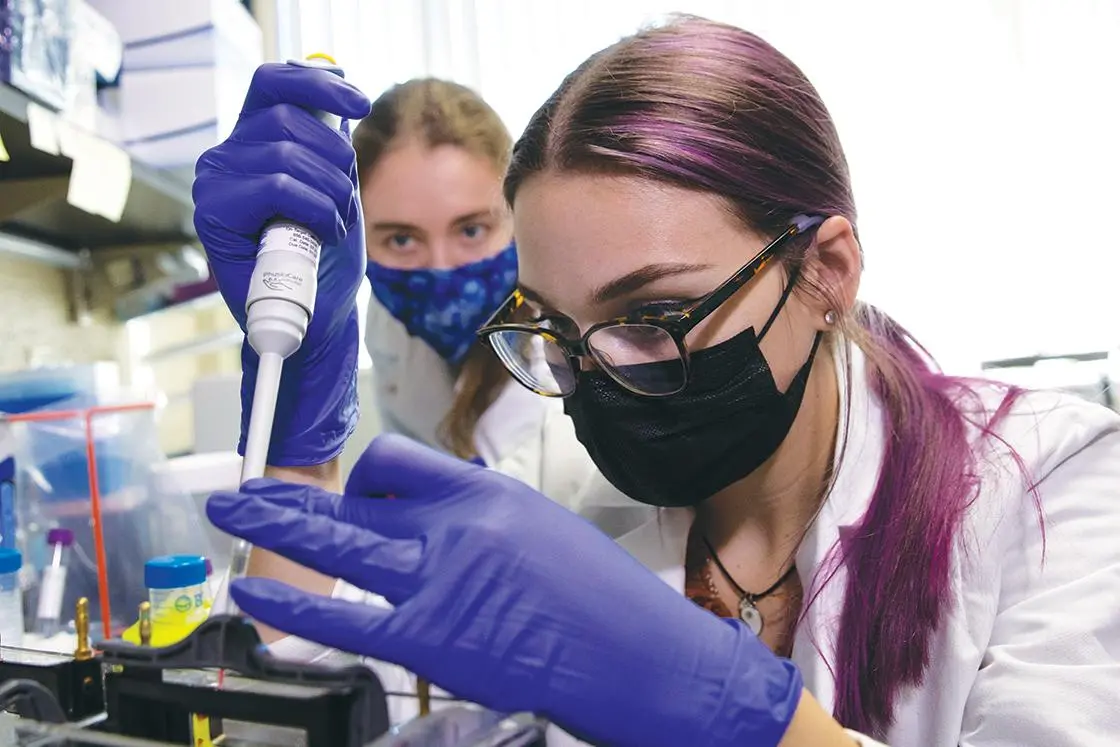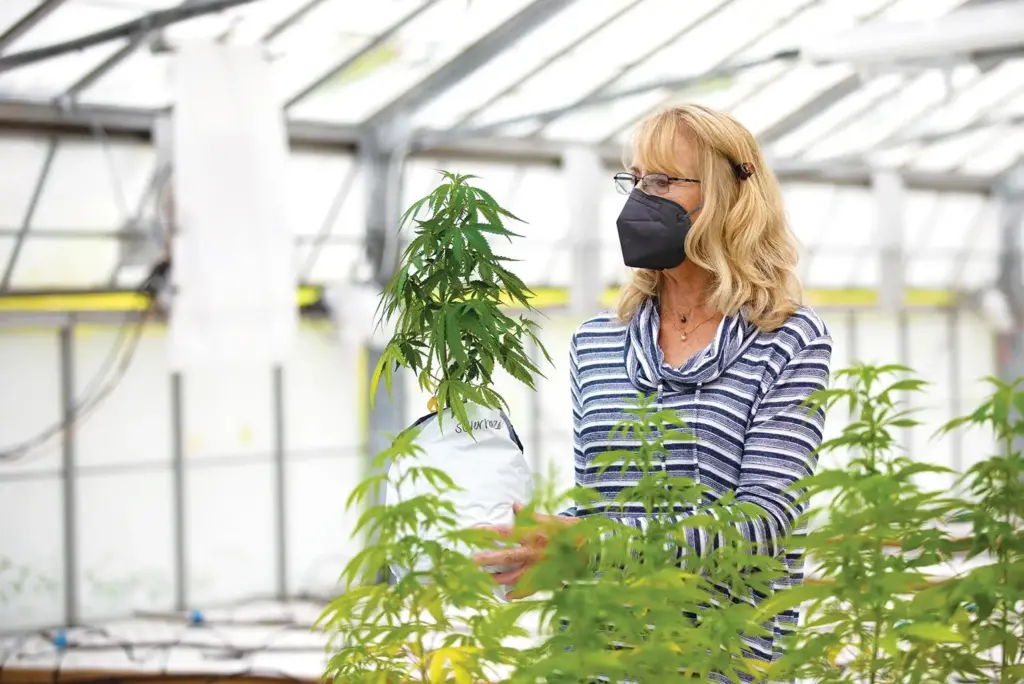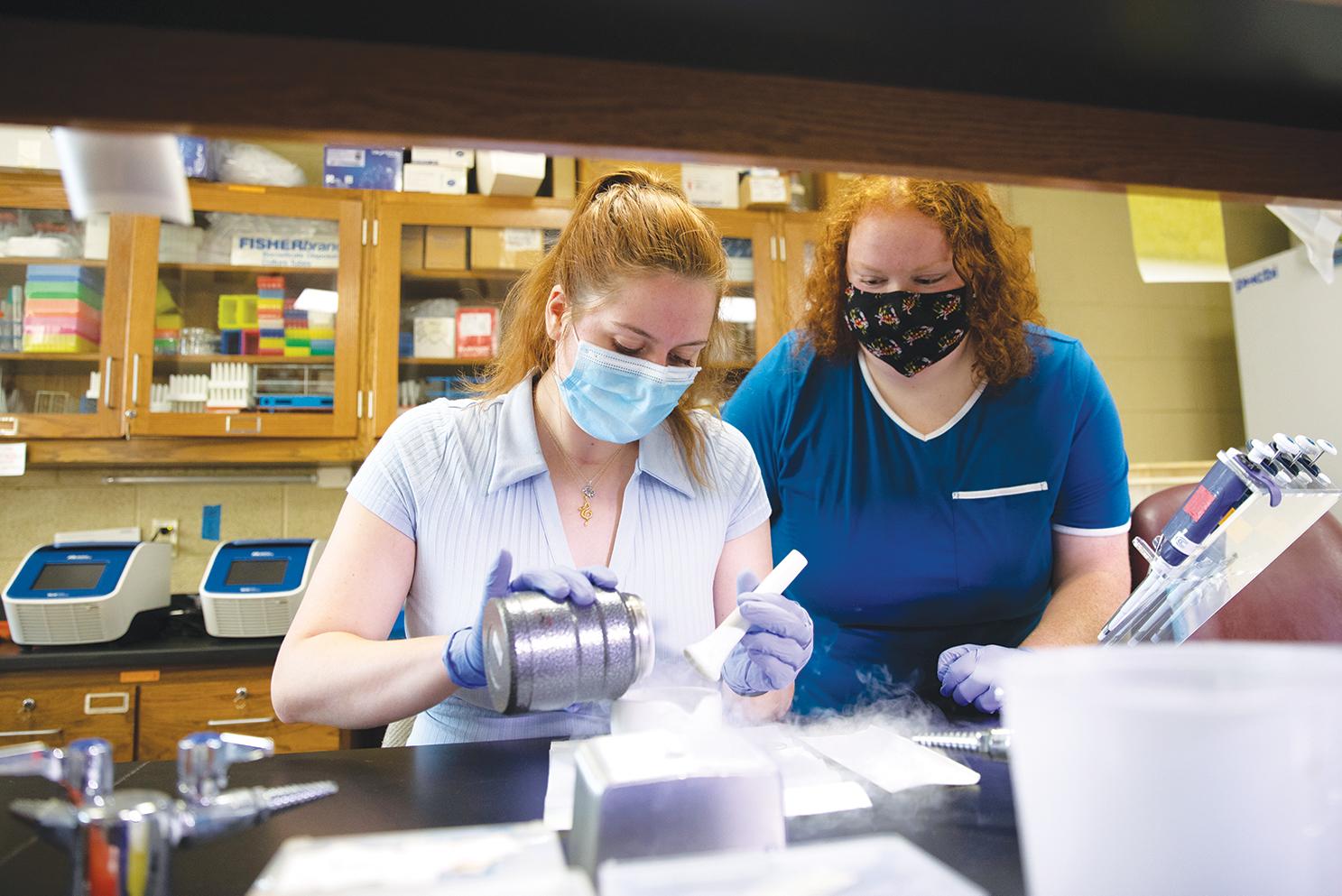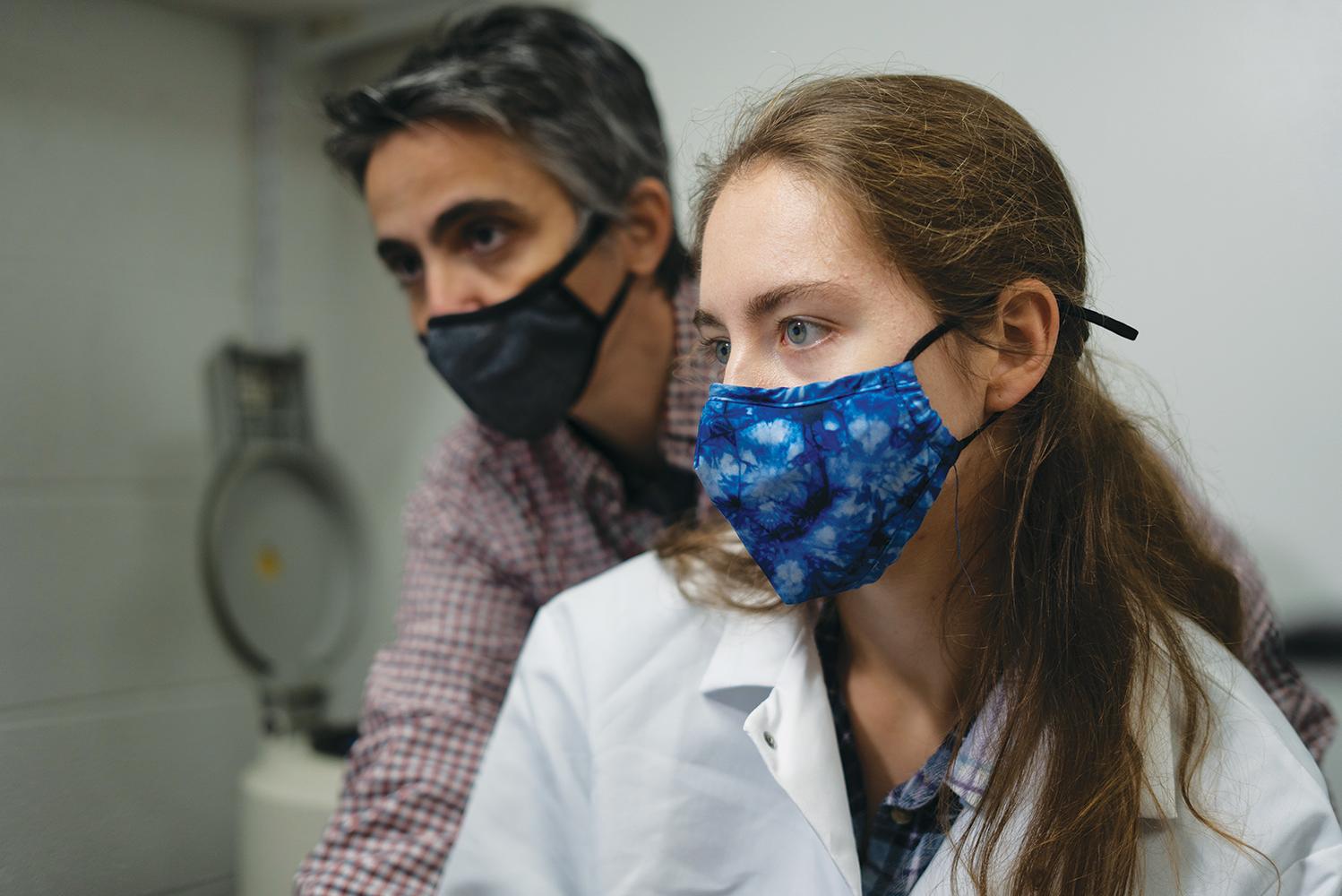From Curiosity to Discovery to Impact

On the second floor of Arcadia University’s Boyer Hall, Katelin Decker ‘22 and Michelle Frank ‘23 pull on rubber gloves and huddle at the biosafety hood in the compact Tissue Culture Lab. The Biology majors are growing cancer cells to test a promising compound—an early step on the road to identifying a drug to treat aggressive forms of breast cancer, including triple negative and inflammatory breast cancer.
“My students are really the driving force for my lab,” says Associate Professor of Biology Maria Theodoraki, who has run a robust undergraduate research program at Arcadia for several years. “A lot of them like the skills that they use in the process of doing research: The ability to ask the correct question, find the correct experiment to answer a specific question, try to figure out what your result means, try to figure out the next question. This is the cycle that people who are interested in research find very exciting.”
For much of the summer, Decker and Frank spent up to 12 hours a day sometimes working in Dr. Theodoraki’s lab, testing the synthesized compound DAP-19 for its potential as an anti-cancer drug. On this bright August afternoon, the fall 2021 semester just underway, the students continue to jam their days with what has become their passion: research.
“It’s a fast moving, critical thinking, trial-and-error environment,” says Decker, who planned a career in industry until this summer. “I was coming into the lab, and two hours became four hours, became eight hours, became 12 hours. I knew I wanted to get a Ph.D. and continue research forever.”
Adds Frank: “We are incredibly curious people. We feed off it.”
That these undergraduates are working on groundbreaking research is a testament to Arcadia’s commitment to providing hands-on, in-the-lab, or in-the-field experiences for its students. Across the University, first-year to graduate students are practicing the scientific process and honing skills in critical thinking, collaboration, and communication. Perhaps most important, they are building confidence to take on new challenges, whether in the lab or in life.
“It is very common for undergraduate students to pursue research projects in collaboration with faculty across all our programs,” says Dr. Rebecca Kohn, vice provost and dean of the College of Arts and Sciences. “It enhances their education and better prepares them for what they’re doing next.”
Adds Dr. Naomi Phillips, an associate professor of Biology, “It’s remarkable for this size of university to have those research opportunities.” She credits Arcadia with seeking out, over the last decade in particular, faculty hires interested in building research programs. “It’s a priority of Arcadia and the Biology department.”

Dr. Naomi Phillips, associate professor of Biology, in the hemp greenhouse.
Innovation in the Studies
Across majors, students are working on innovative studies. While the pandemic halted much lab work, faculty and students proved resilient, connecting on Zoom and using time away from campus to dive deep into literature searches, analyze data, and write procedures. When restrictions eased in the late spring and summer of 2021, labs once again were abuzz as student researchers played catch-up and met challenges.
A sampling of other investigations underway includes:
In Phillips’s lab, Biology majors Maddie Goral ’22, Taylor Wheatly ’22, and Samantha Gilbert ’22, are conducting growth and harvest studies on hemp. In a select partnership the medical cannabis grower/processor Agri-Kind is collaborating with Arcadia, helping to grow the plants and providing the marijuana chemical cannabidiol (CBD) for projects—all of which exposes students to an emerging agribusiness gaining a sizable footprint in the region and creating jobs. Begun in 2019, the interdisciplinary program involves Biology, Forensic Science, and Psychology students. A new minor in Agribusiness, bringing together Biology and the School of Global Business, has been established.

The research faced a setback when about 100 mother plants in the campus greenhouse (which Agri-Kind helped renovate) were lost to an infestation of mites during the pandemic. In summer 2021, students tended to new plants, learning the basics of horticulture. They also are experimenting with the best soil and nutrients for different lines of hemp and the impact on THC, the main compound in cannabis that produces the high sensation, and CBD levels. In addition, Goral is genotyping plants for her senior thesis to evaluate hemp lines for consistency.
Former students Monica Marcuse ’21, a Biology major, and Kylie Candela ’20, ’21M, who earned a master’s in Forensic Science, have worked with Dr. Phillips on conservation genetics, which studies the genetic health of a population. They used next-generation equipment to sequence the whole genome of five of the 11 endangered primates on Bioko, an Equatorial Guinea island off Africa’s west coast. The work, slated to be published in three papers this fall, will help address conservation issues with these species, even as it has honed skills in genetics, essential not only for biologists but forensic scientists trying to solve a whodunit.
Originally, the primate project was the brainchild of former Arcadia Professor of Biology Gail Hearn, who started the Bioko Biodiversity Protection Program in 1998. Arcadia students have conducted counts of the columbines, guenons, and other primates as part of the University’s study abroad program. (Hearn and the program moved to Drexel University in 2007; she retired in 2014.)
Biology major Mary Matos ’22 is conducting a series of rat experiments under Assistant Professors of Psychology Dr. Logan Fields and Dr. Juan Duque, investigating the potential of CBD as a new drug to treat, or ultimately prevent, depression, anxiety, and even psychosis-conditions without effective treatments.
Psychology major Sophia Sar ’21, who plans to pursue a doctorate in cognitive and experimental psychology, is continuing research on synesthesia in the lab of Associate Professor of Psychology Dr. Katherine Moore as a research assistant. “I feel like I grew into my own as a scientist,” says Sar, who now mentors younger students, of her undergraduate experience. Sar is testing memory skills in people with grapheme-color synesthesia, a neurological condition where a person involuntarily experiences colors when thinking about letters, numbers, or words. Grapheme-color synesthetes are known to have better verbal memory than those without synesthesia, and Dr. Moore and her students are investigating why that is.
I came into my own as a scientist.
– Sophia Sar ’21
In another study with Dr. Moore, as well as Professor of Psychology Dr. Steve Robbins, Sar and Psychology majors Jillian Brennan ’22 and Emily Brown ’22 are investigating aphantasia, which is the inability to create a mental image in one’s mind. They are investigating whether people with aphantasia have developed a unique compensatory skill set that leads to superior cognitive performance on some tasks. One goal is to re-examine whether current self-report measures for diagnosing aphantasia might be improved with a more objective behavioral measure. “They will have stronger resumes,” Dr. Kohn says, “[and] when students are in those research labs with peers and with a faculty mentor they get to know very well, it builds a sense of community.”
Cocoa Pebbles with CBD
In Dr. Phillip’s lab in Boyer Hall, Goral is extracting DNA from several samples of hemp plants, which will be amplified and sequenced. She plans to compare the chemical signatures, or chemovars, of three or four lines of hemp cultivars from four different growers across the country “to figure out if it is genetically the same species,” the pre-med student says.
Such research has only become viable in recent years, as states have legalized cannabis use. “There’s all this mythology that came in from the illicit growers,” Dr. Phillips says. “There’s a better process.”
For Agri-Kind, Arcadia’s multi-faceted approach to its hemp program, as well as the Agribusiness minor, is proving a win-win.
“Educating the future workforce in cannabis and the plethora of opportunities within this industry is imperative to create a successful foundation for the industry,” says Chad DiFrancesco, vice president of operations for Agronomed Pharmaceuticals and Agri-Kind. “This partnership allows us to pursue various research objectives while allowing students to work closely with the plant and its constituents.”
In her sophomore year, Matos began working in Arcadia’s Research on Altruism & PsychoPharmacology (RAPP) rat lab as a caretaker of the rodents. Soon, her role morphed into much more. “I never really considered animal research until I started working with Dr. Fields and Dr. Duque,” she says. “Once I started, I realized I very much enjoyed it.”
Now, Matos says she wants to pursue graduate studies in animal behavior or conservation. Currently, she is assisting with a CBD study in which juvenile rats are separated from their mothers, a condition that leads to stress. Then they are given a treat—Cocoa Pebbles laced with CBD. The hypothesis is that the CBD will calm them. Eventually, the rats will undergo behavioral tests—novel object recognition, for one—to assess their level of anxiety. (It is well documented that anxiety and depression affect memory, Matos says.)
“We’re going to see if the CBD helps or not,” she says.
Dr. Fields, who says he was recruited in 2018 because of his passion for research, praises Arcadia and its administration for encouraging faculty and student collaboration—and providing the resources, including partnerships with industry—to explore important questions around CBD.
“The [student] research experience,” he adds, “is one of the best ways to immerse yourself in a field of study, even if you’re not going to be a researcher later on. It gives you a lot of life lessons in a short period of time.” One of the most important, he says, is the ability to think critically through acquiring, integrating, analyzing and presenting information—the essence of research. “If you can learn and excel at research, you will have the capacity to learn and excel in most fields.”
Of course, it can be time-consuming for faculty, especially getting research newbies up to speed. Dr. Fields notes that the fulfillment from the work extends beyond what is discovered in the labs.
“It inspires me to remember the times when I was an undergraduate and a faculty member reached out to me,” he says. “It always made me feel special. I think I see the same light in their eyes when they know a faculty member believes in them.”
“I Can Do This.”
Back in the cell culture lab, Frank uses a glass pipette to suck up the many triple-negative breast cancer cells, known as MDA-MB-231, now detached from the bottom of a flask, where they had adhered in a flat, two-dimensional layer as they grew. The cells are so small that the flask looks empty to the naked eye.
Frank deftly performs the process, known as passaging. Since her first year at Arcadia she has worked with Dr. Theodoraki, or Dr. T, as students call the professor. When Frank was looking at colleges, she checked for undergraduate research opportunities.
“Dr. T’s lab stood out,” she says. “It was a selling point.”
Once at Arcadia, the volleyball recruit happened to get Dr. Theodoraki for “Bio 101”. One day after class, she says, she had this conversation:
“What do you want to do with your life?” Dr. Theodoraki asks.
“I just want to do research.”
“What in?”
“Cells.”
Frank started shadowing Dr. T., whom she considers a mentor, absorbing the professor’s “see, do, teach” method of learning.
Frank, who wants to pursue a doctorate, remembers the first time she performed an experiment—a Western blot test to detect specific protein molecules—solo. “It was, ‘Wow, I can do this.’ That reaffirmed for me that I really want to do this for the rest of my life.”
Frank continues the passaging process, releasing the cells into a new flask with fresh medium to allow them room to continue to grow.
Students are the driving force.
– Dr. Maria Theodoraki
Later Decker will introduce the cancer cells into a gel that allows them to move freely, and over time, the cells will communicate and clump together into three-dimensional structures. These spheroids reflect how actual tumors grow in people. That makes them ideal for testing compounds, and Decker’s senior thesis involves assays on DAP-19, an exciting gambogic acid derivative, testing its effectiveness at killing triple-negative cancer cells. (Gambogic acid is found in the resin of a tree common to Southeast Asia and known for its anti-inflammatory properties.)
“I never thought I would have as much independence as I do,” Decker says, noting that friends at other colleges are often assistants to graduate students, rather than central conductors of the experiments. “Every time I’m in the lab, I can feel it preparing me for my career.”
So far, promising results have confirmed DAP-19’s potential as a therapeutic for inflammatory breast cancer, which currently has poor treatment options. The cutting-edge research has moved along, in part, because of collaborations with scientists at Rowan University and at the University of California, San Diego—a partnership that also will help with the next phase: animal testing of DAP-19.
Like much of the research at Arcadia, Dr. Theodoraki’s projects are supported with funds from the department or the University. Often departments share equipment and labs. “If we had University funding, we could perform more elaborate assays and engage more students,” she says, adding that her wish list includes a flow cytometer instrument.
Still, what Arcadia faculty may lack in high-profile, outside grants is made up “with a lot of determination and time and dedication. I think students appreciate the opportunity.”

Aspen La-Riene Settle ’19 certainly did. The 24-year-old Biology graduate from Tucson, Ariz., says she has always wanted to become a veterinarian but was overwhelmed by the highly competitive process to get into vet school and faltered in “Bio 101” at first. “It set in this feeling of hopelessness, that I’m never going to be a vet,” she says.
Conversations with Dr. Theodoraki inspired confidence in herself. Soon Settle was working on experiments that generated two publications. The experience also made it easier to grasp techniques discussed in class because she had hands-on experience at the lab bench.
Now, she’s a second-year student in a doctoral program at Louisiana State University’s School of Veterinary Medicine in Baton Rouge.
“I still call her,” Settle says, crediting the good professor with opening the door to research and ultimately vet school. “I have no idea where I would be today if I hadn’t built a bond with Dr. Theodoraki.
Lini Kadaba is a former journalist with The Philadelphia Inquirer and a frequent contributor to Arcadia magazine.


